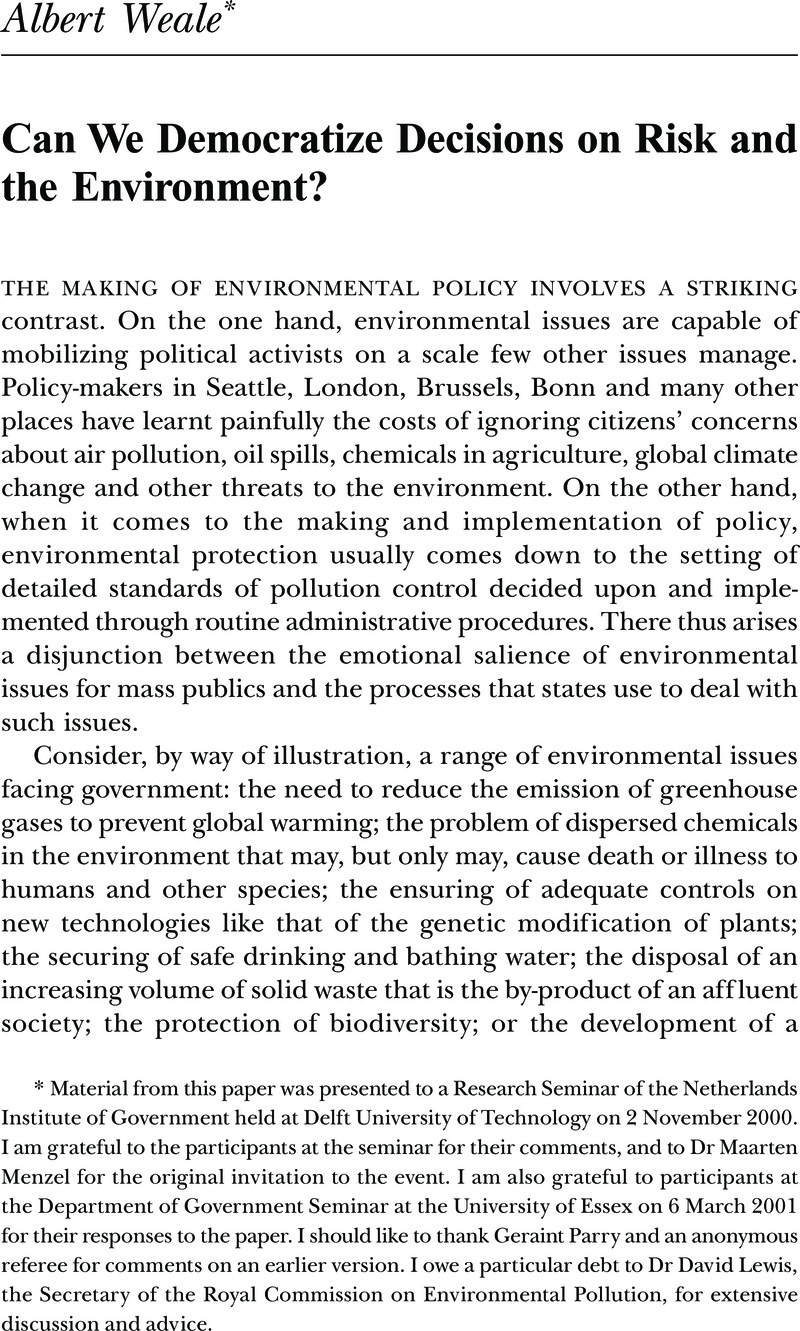Published online by Cambridge University Press: 28 March 2014

* Material from this paper was presented to a Research Seminar of the Netherlands Institute of Government held at Delft University of Technology on 2 November 2000. I am grateful to the participants at the seminar for their comments, and to Dr Maarten Menzel for the original invitation to the event. I am also grateful to participants at the Department of Government Seminar at the University of Essex on 6 March 2001 for their responses to the paper. I should like to thank Geraint Parry and an anonymous referee for comments on an earlier version. I owe a particular debt to Dr David Lewis, the Secretary of the Royal Commission on Environmental Pollution, for extensive discussion and advice.
1 See Vogel, D., National Styles of Regulation, London, Cornell University Press, 1986 Google Scholar; Weale, T. O’Riordan, A. and Kramme, L., Controlling Pollution in the Round, London, Anglo-German Foundation, 1991 Google Scholar; Weale, A., ‘Environmental Regulation and Administrative Reform in Britain’, in Majone, G. (ed.), Regulating Europe, London and New York, Routledge, 1996, pp. 106–30Google Scholar; and Weale, A., ‘Great Britain’, in Jänicke, M. and Weidner, H. (eds), National Environmental Policies: A Comparative Study of Capacity-Building, Berlin, Springer-Verlag, 1997, pp. 89–108.CrossRefGoogle Scholar
2 Royal Commission on Environmental Pollution, Twenty-First Report. Setting Environmental Standards, London, The Stationery Office, 1998,Google Scholar Cm 4053.
3 Ashby, E. and Anderson, M., The Politics of Clean Air, Oxford, Clarendon, 1981, p. 136.Google ScholarPubMed
4 Hajer, M., The Politics of Environmental Discourse, Oxford, Oxford University Press, 1995, p. 115.Google Scholar
5 Marquand, D., The Unprincipled Society, London, Jonathan Cape, 1988, p. 178.Google Scholar
6 For a discussion of these trends generally, see my The New Politics of Pollution, Manchester, Manchester University Press, 1992.
7 See Byatt, I., ‘The Impact of EC Directives on Water Customers in England and Wales’, Journal of European Public Policy, 3:4 (1996), pp. 665–74.CrossRefGoogle Scholar
8 Her Majesty’s Government, Government Response to the Royal Commission on Environmental Pollution’s Twenty-First Report, London, The Stationery Office, 2000, Cm 4794.
9 Royal Commission, Standards, op. cit., p. 123.
10 Royal Commission, Standards, op. cit., p. 126.
11 See, inter alia., Hall, P. A., ‘Policy Paradigms, Social Learning and the State’, Comparative Politics, 25 (1993), pp. 275–96CrossRefGoogle Scholar; Jenkins-Smith, H. C. and Sabatier, P., ‘Evaluating the Advocacy Coalition Framework’, Journal of Public Policy, 14 (1994), pp. 175–203 CrossRefGoogle Scholar; Blyth, M. M., ‘Any More Bright Ideas? The Ideational Turn of Comparative Political Economy’, Comparative Politics, 29:2 (1997), pp. 229–50CrossRefGoogle Scholar; King, A., ‘Ideas, Institutions, and the Policies of Governments: A Comparative Analysis. Parts I and II’, British Journal of Political Science, 3:3 (1973), pp. 291–313 CrossRefGoogle Scholar; King, A., ‘Ideas, Institutions, and the Policies of Governments: A Comparative Analysis. Part III’, British Journal of Political Science, 3:4 (1973), pp. 409–23CrossRefGoogle Scholar; G. Majone, Evidence, Argument and Persuasion in the Policy Process, New Haven and London, Yale University Press, 1989; Sabatier, P. A., ‘Knowledge, Policy-Oriented Learning and Policy Chance: An Advocacy Coalition Framework’, Knowledge: Creation, Diffusion, Utilization, 8:4 (1987), pp. 64–92 CrossRefGoogle Scholar. See also the symposium, ‘Towards Better Theories of the Policy Process’, in PS:Political Science and Politics, 24:2 (1991); P. A. Sabatier and H. C. Jenkins-Smith (eds), Policy Change and Learning: An Advocacy Coalition Approach, Oxford, Westview Press, 1993; Radaelli, C., ‘The Role of Knowledge in the Policy Process’, Journal of European Public Policy, 2 (1995), pp. 159–83.CrossRefGoogle Scholar
For some specific examples of how ideas might play a role in policy formation, see among many others: Hall, P. A. (ed.), The Political Power of Economic Ideas, Princeton, Princeton University Press, 1980 Google Scholar; Hajer, M., The Politics of Environmental Discourse, Oxford, Clarendon Press, 1995 Google Scholar; Heclo, H., Modern Social Politics in Britain and Sweden, New Haven and London, Yale University Press, 1974.Google Scholar
12 Royal Commission, Standards, op. cit., p. 102, at paragraph 7.7.
13 Government Response, op. cit.
14 Schumpeter, J., Capitalism, Socialism and Democracy, London, Allen & Unwin, 1954 edn, p. 295.Google Scholar
15 For a clear statement of this account of the relationship between elitist and deliberative democracy, see Cohen, J., ‘Deliberation and Democracy’, in Hamlin, A. and Pettit, P. (eds), The Good Polity: Normative Analysis of the State, Oxford, Basil Blackwell, 1989, pp. 17–34.Google Scholar
16 Habermas, J., Between Facts and Norms, Cambridge, Polity Press, 1996.Google Scholar
17 Royal Commission, Standards, op. cit., p. 102.
18 Ibid., p. 113.
19 Ibid., p. 111.
20 Ibid., p. 104.
21 Ibid., p. 119.
22 ENDS Report, 298 (November 1999), p. 11.
23 Amy, D., The Politics of Environmental Regulation, New York, Columbia University Press, 1987.Google Scholar
24 See, in particular, Majone, G., ‘Regulatory Legitimacy’, in Majone, G. (ed.), Regulating Europe, London and New York, Routledge, 1996, pp. 284–301 CrossRefGoogle Scholar. See also House of Lords Select Committee on Science and Technology, Science and Society, London, The Stationery Office, 2000, pp. 42–3 at paragraphs 5.42–6.
25 Select Committee on Science and Technology, Science and Society, p.76.
26 See, Weale, A. et al., Environmental Governance in Europe, Oxford, Oxford University Press, 2000, pp. 403–8.Google Scholar
27 Environment Agency, Endocrine-Disrupting Substances in the Environment: The Environment Agency’s Strategy, available at http://www.environment-agency.gov.uk/ourservices/consultations.
28 Royal Commission, Standards, op. cit., p. 110 at paragraph 7.37.
29 For a discussion of the Swiss electorate in relation to a referendum on environ-mental issues, see Kriesi, H., ‘Individual Opinion Formation in a Direct-Democratic Campaign’, British Journal of Political Science Google Scholar, forthcoming.